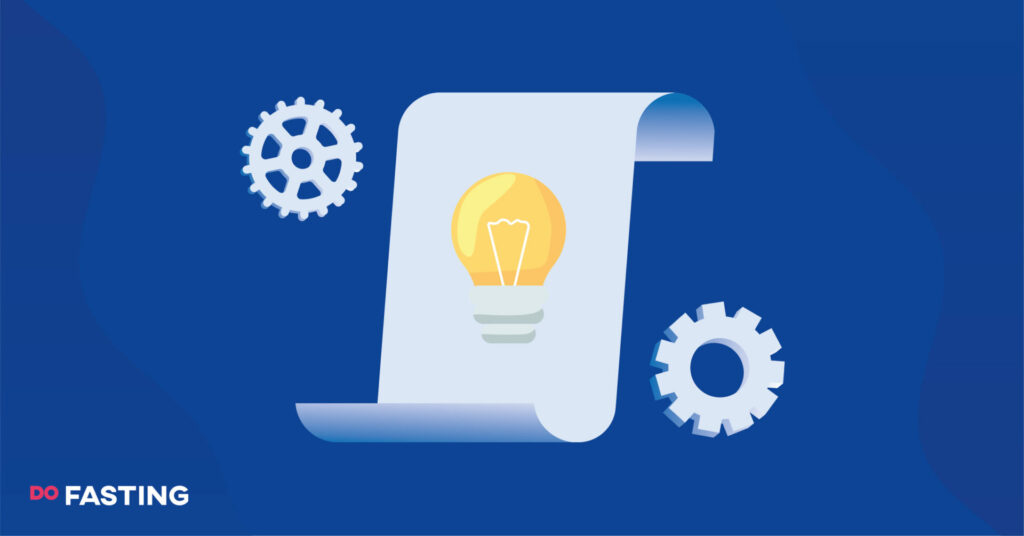Contents
What Is Eat Stop Eat?
Eat Stop Eat is a type of intermittent fasting created by the author of the book “Eat Stop Eat,” Brad Pilon. The author wrote the book after looking more into the outcomes of short-term fasting at the University of Guelph.
As he puts it, it’s a strategy of scheduling your meals that’s slightly different from conventional weight-loss diets. He highlights the need to maintain a healthy total food consumption and that you must eat responsibly.
It’s a 24-hour fast that can be done once or twice weekly. It’s similar to other types of fast such as the 12:12, 14:10, 16:8, 18:6, and 20:4, but it’s a bit more advanced. All of these fasts are aimed at weight loss and boosting your metabolism.
Eat Stop Eat allows you to decide your own schedule, and differently from some other intermittent fasting diets, you can fast only once or twice per week.
This fast is suitable for healthy adults. However, it requires long periods of fasting, which may be difficult for many people. As a result, before attempting it, consult a medical professional.
Take a
1-minute quiz
and discover how much weight you can lose with DoFasting!

How Does Eat Stop Eat Fasting Work?
Eat Stop Eat involves fasting for 2 non-consecutive days per week.
For example, if you fast on a Monday, your following fast should be at least one day later. On those two fasting days, you fast for 24 hours each.
The remaining 5 days of the week are when you can eat freely. However, it’s suggested to eat nutritious foods and avoid binge eating.
To put things into perspective, you’ll be fasting from, let’s say, 7 a.m. Monday until 7 a.m. Tuesday, or any other day of the week that you choose. However, you must eat at least one meal before 7 a.m. Monday and then after 7 a.m. Tuesday.
This way, you’ll be fasting for precisely 24 hours.
How Does Eat Stop Eat Fasting Help With Weight Loss?
No studies specifically talk about Eat Stop Eat’s effect on weight loss. Nonetheless, intermittent fasting and occasional absence from eating are acknowledged to aid with weight control. Let’s see how.
Helps you burn body fat
Periodically abstaining from food can activate a fat-burning state. Moreover, when ketone bodies (molecules) are created, your body enters a metabolic state known as ketosis.
Ketosis is a metabolic state that occurs when your body runs out of glucose as an energy source and begins to burn stored fat.
Eat Stop Eat does need a 24-hour fast, which can be adequate for your body to start using fat for fuel instead of carbohydrates. There is, however, no scientific evidence as to when exactly your body enters ketosis.
In addition, it can help you increase your muscle mass.
Helps you stay in a calorie deficit
A calorie deficit is inevitable when it comes to weight loss. Simply put, you must consume fewer calories than you burn to effectively get rid of any extra pounds or avoid weight gain. Most of the well-known diets also emphasize the importance of calorie deficit.
When you follow an Eat Stop Eat plan, you eat less than you would usually. This is why intermittent fasting may be a more efficient strategy to lose weight than attempting to stick to a diet requiring daily calorie deficits.
It might be easier to stay motivated and achieve your fat loss goals if you don’t have to restrict yourself on non-fasting days. Eat Stop Eat method might also be less stressful and allow you to maintain a calorie deficit for as long as necessary.
Helps you burn calories
Eat Stop Eat diet can trigger a metabolic shift, allowing you to eat more and still lose weight. The metabolic change means you can eat your favorite meals during your eating window and still burn the needed calories.
Moreover, intermittent fasting can increase norepinephrine levels. Norepinephrine is a hormone and neurotransmitter that can improve your metabolism and help you burn more calories in a day.
As a result, fasting for brief periods can enhance your metabolism, allowing you to burn calories more efficiently.
Other Benefits of Eat Stop Eat Fasting
This particular intermittent fasting regime can be a great way to manage your weight. Nevertheless, there are other benefits that might pique your interest.
Better blood sugar control
Because you restrict calories, intermittent fasting can help improve insulin sensitivity. As a consequence, you’ll have better blood sugar levels throughout your fasting period or after your meals, which can be helpful for people with diabetes.
Besides, Eat Stop Eat diet and intermittent fasting is an effective treatment option for people with impaired glucose and lipid metabolism, and it has the potential to enhance glucose and lipid metabolism.
Increased longevity
It has been clinically established that brief cycles of periodic fasting-mimicking diets (FMD) have a variety of positive impacts on aging as well as risk factors for cancer, diabetes, heart disease, and other age-related illnesses.
Because intermittent fasting has an effect on metabolic health, Eat Stop Eat can help postpone or avoid the most prevalent age-related damage to organs and illnesses, increasing longevity.
Moreover, calorie restriction has been established to help maintain proper health and prolong your life. Hence, fasting for 24 hours two times a week will automatically make you consume fewer calories than you normally would.
Supports your immune system
Calorie restriction and intermittent fasting have been shown in numerous clinical contexts to produce several health advantages, including immune system support. This food restriction also induces autophagy, a cell surveillance function that improves immunity.
This is because when you fast, your body begins to store energy and so removes old or damaged immune cells. Additionally, it promotes the production of new cells, strengthening your immune system and improving your resistance to diseases and viruses.
It also reduces inflammation in the body, which aids in the defense against illness.
Good for your heart
An intermittent fasting diet can reduce blood pressure and cholesterol levels, which is very important for cardiovascular health. Therefore, a regular 24-hour fast can be good for your heart.
Eat Stop Eat can improve the way your body metabolizes sugar and lower your chance of developing diabetes, which is a risk factor for heart disease.
Take a
1-minute quiz
and discover how much weight you can lose with DoFasting!

Risks and Drawbacks to Consider
Going for a 24-hour water-only diet can have great benefits, but there are some possible downsides you should consider.
Risk of nutrient deficiency
Eat Stop Eat reduces your caloric consumption throughout the week. However, it can increase the risk of nutrient deficiencies at the same time.
People who already struggle to fulfill their nutritional needs or obtain enough food should be aware that Eat Stop Eat might lead to nutrient deficiency and therefore cause risky weight loss and a decrease in energy levels.
This indicates that you must always pay attention to your meals on your eating days. Therefore, make sure that you’re getting enough vitamins and minerals and consume the right amount of fiber and protein.
Having a diet plan ahead of time and researching your nutritional needs can also help avoid this possible downside.
Hormonal changes in some people
Even though long-term and short-term fasting can improve health and weight, some people may have hormonal changes due to the Eat Stop Eat diet. According to particular research, intermittent fasting can benefit women’s health by improving fertility and specific hormones.
However, Eat Stop Eat diet can negatively affect the hormones in men. It can, for example, lower testosterone levels, which can severely influence sexual health.
Besides that, an intermittent fasting diet can have an effect on a woman’s menstrual cycle and cause irregular periods. Therefore, consult a medical professional if you experience these symptoms.
Possible drop in blood sugar
The Eat Stop Eat diet could be useful for prediabetes since it improves insulin sensitivity and blood sugar levels. However, if the blood sugar drops too low, it can be just as dangerous.
When you go without eating for a prolonged period of time, your blood sugar naturally drops. Nonetheless, for some people, it might fall to the point where it is no longer safe or beneficial. This can be a state of hypoglycemia which can cause you to feel shaky or even pass out.
If you tend to have low blood sugar or are taking any blood-sugar-lowering medications, do consult a qualified healthcare provider before attempting to try a new fasting schedule.
Irritable mood
Many people become irritable when they are hungry. Some individuals even refer to the state as “hangry.”
The mood shift can be a lot worse when following an Eat Stop Eat eating pattern. As we already established, fasting or periods of calorie restriction can lower your blood sugar levels.
Low blood sugar can cause anxiety, concentration issues, and irritability.
Feeling both hungry and anxious at the same time might make fasting extra challenging. As a result, consume plenty of healthy and nutritious food on your non-fasting days, and minimize your fasting durations if that doesn’t help.
Additional side effects
Apart from such risks as nutrient deficiency, hormonal changes, blood sugar drops, and irritable moods – there are a few more side effects that you should keep in mind:
- Hunger and cravings – it’s natural to feel hungry after going without meals for an extended length of time. Fortunately, your body adjusts to regular fasting periods, and you should eventually feel less hungry.
- Headaches – people usually experience headaches on the first few fasting days. To minimize this side effect, make sure to get enough rest and drink liquids.
- Low energy – low blood sugar can lead to exhaustion during your fasting window. Nevertheless, your body should adapt and minimize the feeling of fatigue eventually. Also, do make sure to get 8 hours of sleep and stay hydrated.
5 Tips to Make Eat Stop Eat Fasting More Effective
Eat Stop Eat has a variety of health benefits. If you want to increase their effectiveness, here are some pointers:
1. Start slowly
If you’re entirely new to fasting, jumping right into 24-hour fasts two times a week can be demotivating. Therefore, it can be too challenging to complete. Besides, you might experience the side effects listed above and lose motivation altogether.
Fasting being too difficult is why it’s important to start slow. Take breaks, try out one day a week instead of two, or even try a simpler type of intermittent fast at first.
Also, take time to plan your schedule, your meals, and your goals. Ease into fasting mindfully, have clear intentions, and don’t be too hard on yourself.
2. Consume healthy fats and protein during your eating window
To make sure you meet your nutritional needs – consume plenty of healthy fats and protein during your eating window. These can be:
- Eggs
- Bone broth
- Herring
- Salmon
- Sardines
- Chia seeds
- Peanuts
Consuming healthy fats and protein will enhance weight loss benefits and allow you to stay in fat-burning mode as long as possible.
3. Avoid processed and salty food
Salty meals can contribute to high blood pressure, heart disease, kidney failure, and other health problems. Processed meals include an excessive amount of salt, sugar, and fat, and you may be unaware of it when eating a highly processed meal.
Examples of these foods:
- Savory snacks
- Sweet snacks
- Ready-made meals
- Cakes
- Cereals
- Sugary beverages
- Frozen meals
- Margarine
- Candies
Besides, these foods naturally have more calories and can interfere with your weight loss goals or intermittent fasting benefits.
4. Use nutritional supplements to facilitate your efforts
Plenty of dietary supplements out there could help ease your efforts. For instance, appetite suppressants can help you regulate your hunger while also providing those extra vitamins.
You might also try supplements containing exogenous ketones, which can boost the advantages of Eat Stop Eat and make weight management more effortless.
5. Do low-intensity exercises
Any type of movement is beneficial for losing weight and your overall well-being. Hence, combining an Eat Stop Eat diet with low-intensity exercises can offer excellent results.
Examples of low-intensity exercises:
- Yoga
- Walking
- Swimming
- Cycling
Moreover, exercising while fasting boosts fat burning, resulting in greater weight loss.
If you suddenly run out of ideas, the DoFasting app provides numerous beginner-friendly home workouts that you can try out at any time. These workouts are prepared by experts and can help you reach your goals faster.
Who Should Not Try the Eat Stop Eat Fast?
All things considered, there are certain people that should not try the Eat Stop Eat fast at all:
- Pregnant, nursing, or trying to get pregnant women – pregnant and nursing women have higher calorie needs. Also, Eat Stop Eat can have adverse effects on their hormones.
- People with eating disorders – can worsen the symptoms.
- People that experience disordered eating – can trigger unhealthy habits.
- Underweight people – might lose even more weight.
- Athletes – have higher calorie needs and need to maintain their muscle mass.
- People with active jobs – have greater calorie needs, and intermittent fasting schedules can interfere with their ability to work.
However, if you don’t fall into these categories but are still in doubt, do consult your doctor.
Take a
1-minute quiz
and discover how much weight you can lose with DoFasting!

Eat Stop Eat: The Key Takeaways
Eat Stop Eat is a sort of fast in which you fast for 24 hours on two non-consecutive days every week. It can assist you in losing weight, improving your metabolism, and strengthening your immune system.
It may also have some drawbacks, like nutrient deficiencies and hormonal imbalances, so be sure Eat Stop Eat is good for you before giving it a try.
Leave a Reply
See how DoFasting will improve your life
Find out what works for you with this 60-sec quiz approved by our experts and get your personal revolutionary fasting assistant.
Start the Quiz
This is an evidence-based article that includes scientific citations. DoFasting’s professional writers and editors prepared the content, which a team of medical experts verified to be accurate.
















2 Comments
That is a good tip particularly to those fresh to the blogosphere. Brief but very precise information… Thanks for sharing this one. A must read article!
Hello. Thank you for your feedback about our blog, it motivates us!